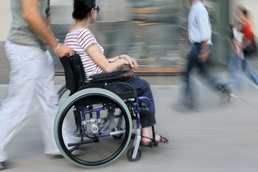Public attitudes to disability have improved in the last 20 years
Six out of ten disabled people believe that public attitudes to disability have improved in the past two decades but a significant proportion still say that they experience discrimination, according to research by the charity Scope.
 The organisation is marking 20 years since changing its name from The Spastics Society to Scope, by opening up its archives with the publication of an online gallery of images and research, tracking attitudes to disability in this period.
The organisation is marking 20 years since changing its name from The Spastics Society to Scope, by opening up its archives with the publication of an online gallery of images and research, tracking attitudes to disability in this period.
Scope’s chief executive, Richard Hawkes, says: “Disabled people’s aspirations are higher than ever before. But public attitudes still have a long way to go.
“Many disabled people continue to face negative attitudes, in the playground, in the street, and from employers. Often it’s because people feel awkward around disability. Not enough people know a disabled person, or know enough about disability.
“In 2014 the challenge is to keep pushing for change so that disabled people can continue to play a greater role in society and be more and more visible in all aspects of daily life.”
Data suggests that incidences of staring and name-calling have fallen significantly since 1994 - with 59 per cent of disabled people experiencing staring twenty years ago, compared to 30 per cent today.
Disabled campaigners point to key moments, including the introduction of the Disability Discrimination Act in 1995 and the establishment of the Disability Rights Commission in 1999, as having transformed the expectations and aspirations of disabled people. There is also evidence that more than half of disabled people (56 per cent) believe that the Paralympic Games in 2012 improved society’s perceptions of disabled people.
However, despite this progress, Scope’s research shows that there is still a long way to go in challenging attitudes to disability in the UK today. Around half of disabled people (49 per cent) report having experienced discrimination in shops, and nearly a third (31 per cent) in cinemas and the theatre.
Furthermore, two in five (42 per cent) disabled people feel that they have missed out on a job “every time” or “a lot of the time” because of their disability.
Latest News
 29-Jul-24
Dementia Bus gives carehome.co.uk staff insight into life with dementia
29-Jul-24
Dementia Bus gives carehome.co.uk staff insight into life with dementia
 01-Mar-24
Find out the top care homes in 2024
01-Mar-24
Find out the top care homes in 2024
 21-Mar-23
UK's top care homes in 2023 revealed
21-Mar-23
UK's top care homes in 2023 revealed
 03-Jan-23
carehome.co.uk launches free care helpline
03-Jan-23
carehome.co.uk launches free care helpline
 13-Dec-22
5 mins with Emily Whitehurst, chief operating officer for Constantia Healthcare
13-Dec-22
5 mins with Emily Whitehurst, chief operating officer for Constantia Healthcare